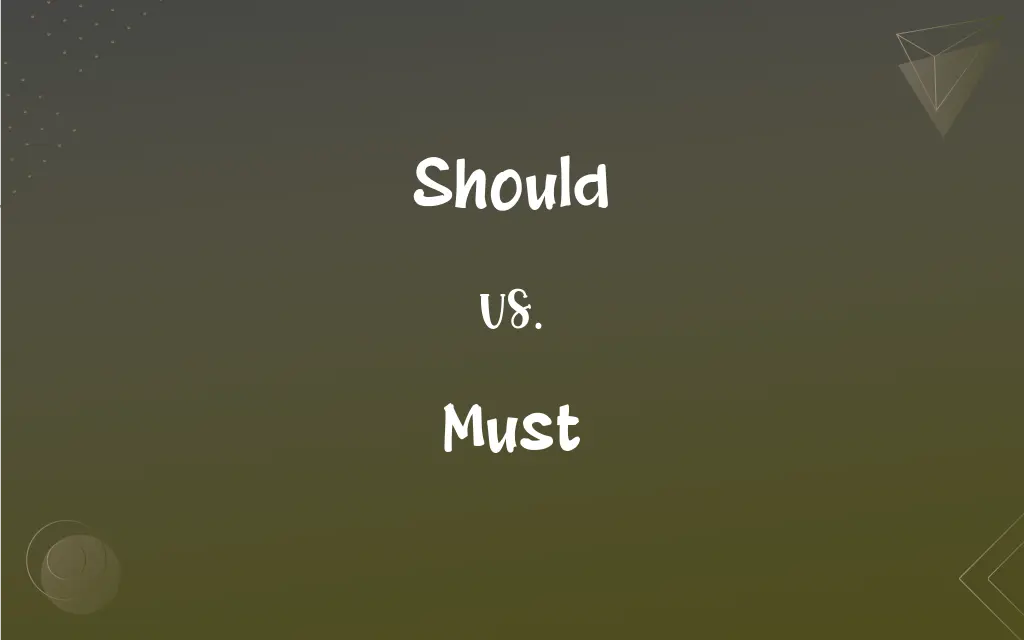Should vs. Must: What's the Difference?
Edited by Harlon Moss || By Janet White || Published on January 17, 2024
Should implies a recommendation or advice, while must denotes an obligation or requirement.

Key Differences
Should is used to suggest what is appropriate or advisable, often based on norms or expectations. Must, however, is used to express necessity or compulsion, often backed by rules or laws.
When using should, the speaker is giving a suggestion or opinion, implying a choice. In contrast, must implies a mandate, leaving little to no room for choice.
Should often carries a moral or best-practice connotation, guiding towards a desirable action. Must, on the other hand, is more about enforcing action, indicating something that is unavoidable or essential.
The use of should can also imply a softer, more polite tone, especially in giving advice. Must is more forceful, used to express firm requirements or imperatives.
In terms of consequence, not following a should may lead to suboptimal outcomes, but not necessarily severe consequences. Ignoring a must often results in significant repercussions or penalties.
ADVERTISEMENT
Comparison Chart
Tone
Advisory, suggestive.
Obligatory, imperative.
Level of Necessity
Moderate, preferred action.
High, required action.
Consequences
Less severe, often social or personal.
More severe, often legal or mandatory.
Flexibility
More flexible, allows for discretion.
Less flexible, demands compliance.
Context of Usage
Advisable situations, recommendations.
Mandatory situations, rules, regulations.
ADVERTISEMENT
Should and Must Definitions
Should
Expressing an expectation or assumption.
He should be here by now.
Must
Used to assert something is true.
She must be over 50 years old.
Should
Indicates a probable or expected outcome.
It should rain tomorrow.
Must
Indicates a requirement or an imperative.
All passengers must fasten their seatbelts.
Should
Used to indicate obligation or duty.
You should apologize for your mistake.
Must
Expresses an unavoidable obligation.
I must finish this project by tomorrow.
Should
Used to give advice or recommendations.
You should see a doctor for that injury.
Must
Expresses a necessity or compulsion.
You must stop at a red light.
Should
Suggests a desirable or appropriate action.
You should eat healthier.
Must
Indicates a strong recommendation.
You must try this restaurant, it's excellent.
Must
To be obliged or required by morality, law, or custom
Citizens must register in order to vote.
FAQs
Is must always legally binding?
Not always legal, but it does indicate necessity or compulsion.
Can should be used in legal contexts?
Rarely. It's more common in guidelines than legal mandates.
Does should imply a choice?
Yes, it often leaves room for personal judgment.
Is should always optional?
Generally, yes. It's more about advice than obligation.
Can must be used in casual suggestions?
It's less common, as it implies strong compulsion.
Does must indicate a higher degree of necessity than should?
Yes, must implies a stronger necessity or requirement.
Can should be used to express probability?
Yes, it can imply likelihood or expectation.
Is should used for giving polite suggestions?
Yes, it's often used for polite advice or recommendations.
Does should imply less responsibility than must?
Generally, yes. Should is less about obligation.
Can must be used for advice?
Rarely. It's primarily for obligations, not general advice.
Is must used in emergency instructions?
Yes, it's common in urgent or mandatory situations.
Can must be used to express assumptions?
Yes, especially to assert something strongly.
Is should common in formal recommendations?
Yes, especially in non-mandatory guidelines.
Does should suggest better practices?
Often, it's used to guide towards preferable actions.
Is should softer in tone than must?
Yes, it's less forceful and more advisory.
Is must used in enforcing rules?
Yes, it's often used where compliance is non-negotiable.
Does must always indicate no alternative?
In most cases, yes, as it demands a specific action.
Does must always require immediate action?
Often, as it signifies urgency or necessity.
Can should be ignored without consequences?
Sometimes, though it may lead to suboptimal outcomes.
Can must be replaced by should in directives?
Not usually, as it would reduce the sense of obligation.
About Author
Written by
Janet WhiteJanet White has been an esteemed writer and blogger for Difference Wiki. Holding a Master's degree in Science and Medical Journalism from the prestigious Boston University, she has consistently demonstrated her expertise and passion for her field. When she's not immersed in her work, Janet relishes her time exercising, delving into a good book, and cherishing moments with friends and family.
Edited by
Harlon MossHarlon is a seasoned quality moderator and accomplished content writer for Difference Wiki. An alumnus of the prestigious University of California, he earned his degree in Computer Science. Leveraging his academic background, Harlon brings a meticulous and informed perspective to his work, ensuring content accuracy and excellence.







































































